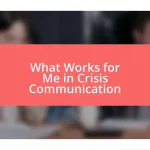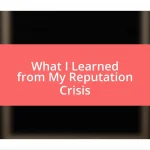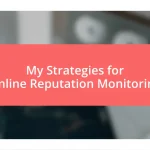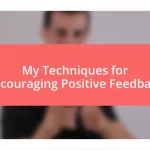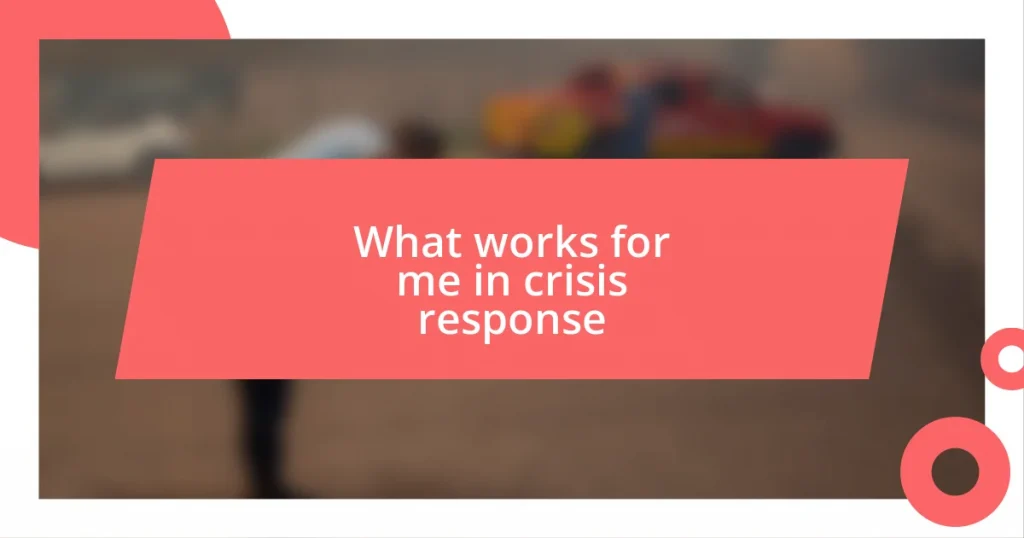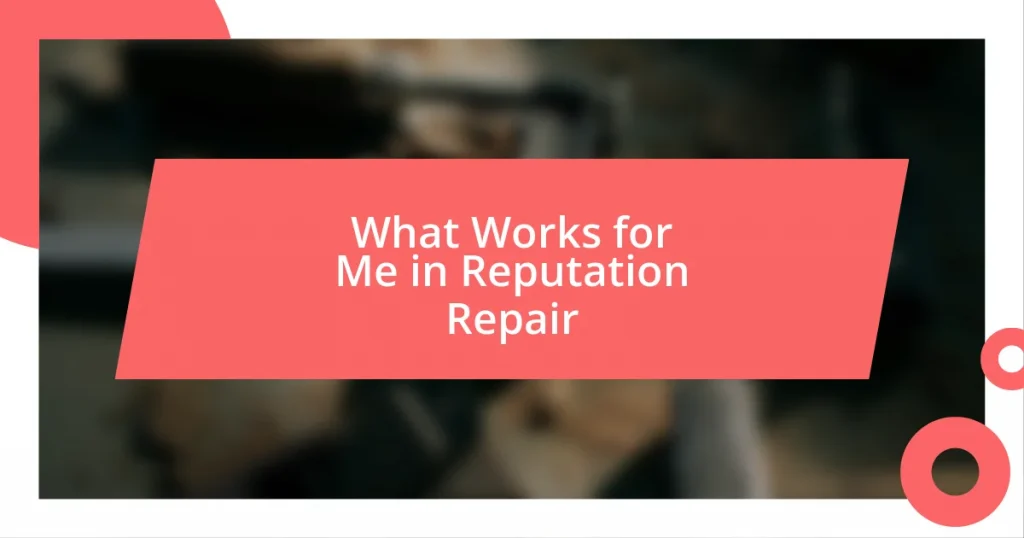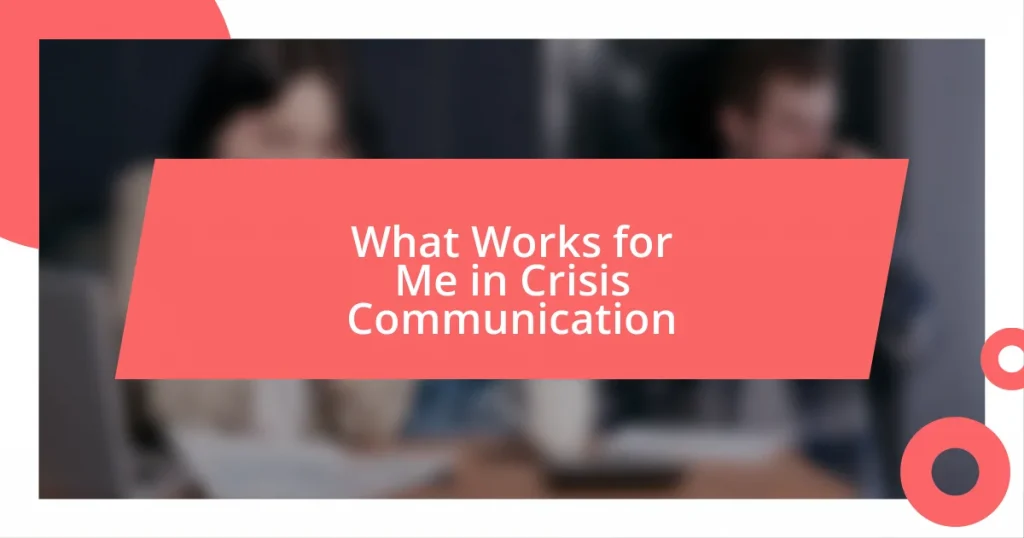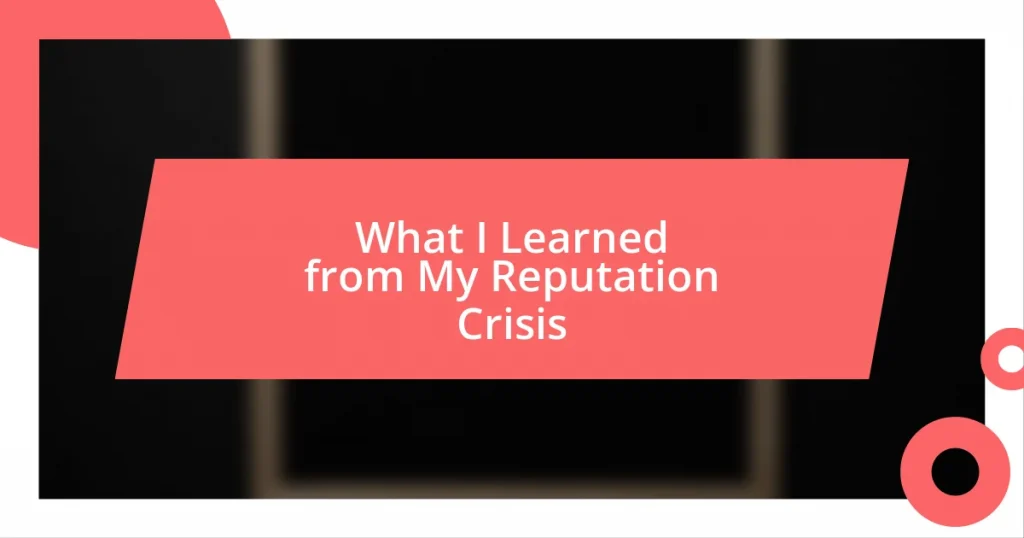Key takeaways:
- Understanding the emotional and dynamic needs during crises is essential for effective responses, emphasizing empathy and clear communication.
- Identifying and utilizing personal strengths such as resilience, empathy, and adaptability can enhance individual and collective crisis management effectiveness.
- Continuous reflection and improvement on past experiences, along with fostering open communication and collaboration, are vital for enhancing crisis management strategies.
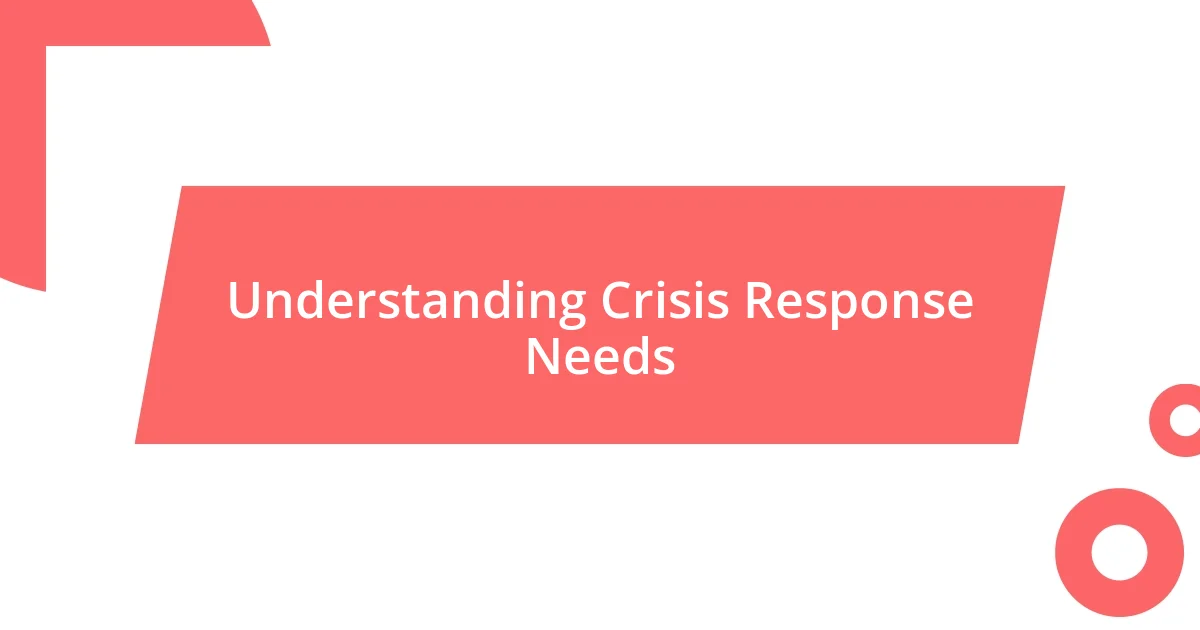
Understanding Crisis Response Needs
Understanding the needs in a crisis response is crucial; it’s not just about having a plan but really grasping the emotions and dynamics at play. I remember a time when I faced a sudden family emergency, and the chaos left me feeling not only overwhelmed but also desperate for clarity. In those moments, having supportive figures who understood the immediate need for empathy and clear communication made all the difference.
Have you ever found yourself in a situation where the usual responses just didn’t cut it? I certainly have. During a community crisis, traditional approaches felt flat. We quickly learned that listening to those directly affected was vital to tailoring our response effectively. This taught me that acknowledging unique perspectives—considering the fears, concerns, and hopes of individuals—can actually transform an impersonal plan into a relevant lifeline.
Moreover, recognizing individual strengths within a team can dramatically shift the crisis response dynamics. When I worked with colleagues who inspired confidence, their energy helped foster resilience during a tough project. Isn’t it fascinating how collective emotional intelligence can enhance our ability to navigate through turbulent times? Every voice matters in crafting an efficient, compassionate response that addresses not only logistical needs but emotional ones as well.
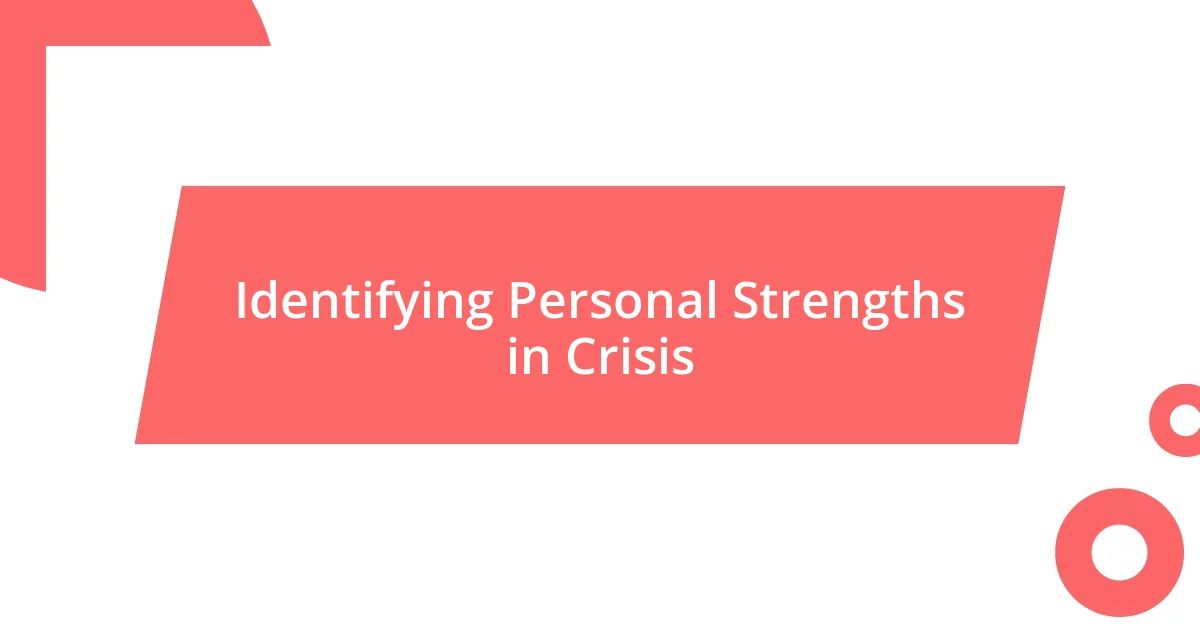
Identifying Personal Strengths in Crisis
Identifying personal strengths during a crisis can be a transformative experience. I once found myself in a challenging situation where quick thinking was required. I realized that my ability to stay calm and assess options allowed me to lead a group out of uncertainty. It’s not always about having the right answers; sometimes, staying grounded and encouraging others is what makes a significant impact.
Reflecting on my own strengths in high-stress moments has revealed key traits that I tap into consistently. Here’s what I’ve discovered about myself and the qualities that help me thrive:
- Resilience: I bounce back from setbacks, which inspires those around me.
- Empathy: Understanding others’ emotions helps me connect and provide support.
- Adaptability: I can think on my feet and adjust strategies as circumstances change.
- Active Listening: Giving people a voice makes them feel heard and valued, essential in any crisis.
- Communication: Clear, open communication fosters trust, even in chaotic situations.
By recognizing these personal strengths, I’ve learned to navigate crises with greater confidence while uplifting others around me.
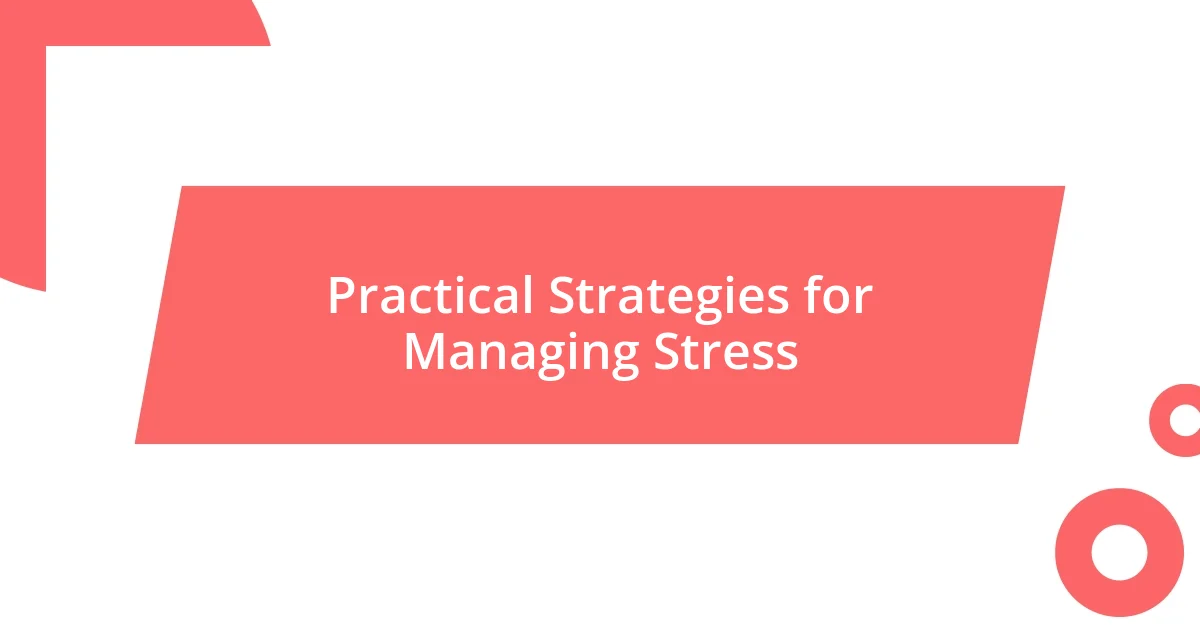
Practical Strategies for Managing Stress
Managing stress effectively during a crisis can make a world of difference. One strategy I find incredibly helpful is practicing mindfulness. During a particularly tense project deadline, I took a moment to focus on my breath and ground myself in the present. This brief pause helped me regain perspective, allowing me to tackle the challenges ahead with renewed energy and clarity. Think about how much more effective we can be when we take a moment to center ourselves.
Another practical approach is to create a list of actionable steps. When faced with overwhelming tasks, breaking them down into smaller, manageable components has served me well. I recall a time when I was part of a disaster relief effort; by listing specific tasks and prioritizing them, we tackled each item one by one, transforming a seemingly insurmountable situation into a series of achievable goals. This method not only reduces anxiety but also fosters a sense of accomplishment along the way.
Lastly, leaning on social support systems can be invaluable. I’ve often turned to friends or colleagues during stressful times, and their different perspectives and encouragement have helped me find solutions I hadn’t considered. Have you ever reached out to someone during a crisis? It truly reminds me that sharing burdens can often lighten them, making the path through tough times feel less daunting.
| Strategy | Description |
|---|---|
| Mindfulness | Focusing on the present moment to reduce anxiety and enhance clarity. |
| Actionable Steps | Breaking tasks into smaller, manageable items to tackle overwhelm. |
| Social Support | Reaching out to friends or colleagues to gain perspective and encouragement. |
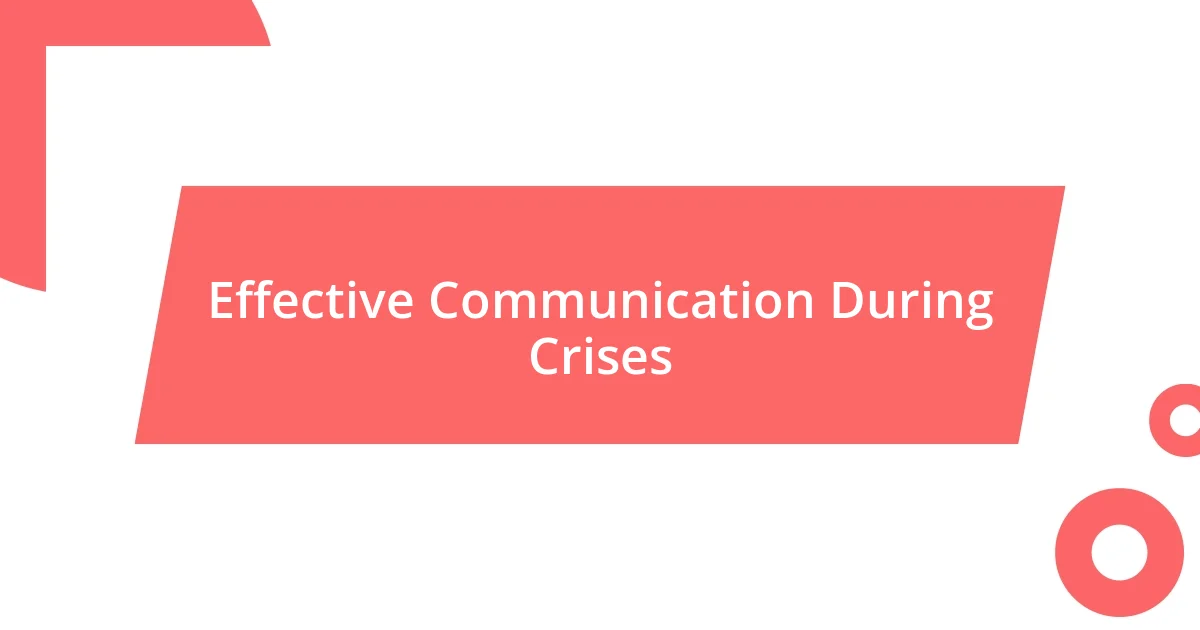
Effective Communication During Crises
Effective communication plays a pivotal role during crises. I remember a time when clear messaging was critical in a community emergency. By keeping everyone informed with concise updates, I noticed that anxiety among the group significantly decreased. It’s amazing how much a simple message can cut through chaos, don’t you think?
During a crisis, I find that using a calm and reassuring tone can make all the difference. When I was part of a team responding to an unexpected evacuation, I focused on projecting confidence even when I felt uncertain inside. Sharing information with empathy not only reassured those around me but also fostered a collective sense of resilience that truly pulled us together.
It’s also essential to be transparent, which can be challenging, especially when information is limited. I recall leading a team where we faced significant unknowns. I chose to openly acknowledge the situation’s complexity while encouraging everyone to voice their concerns. Those moments of vulnerability not only strengthened our communication but also built trust within the group, proving that honest dialogue can empower people, even in turbulent times. Have you ever felt that sharing uncertainty brought your team closer together? I certainly have, and it’s often in those raw moments that true cohesion is built.
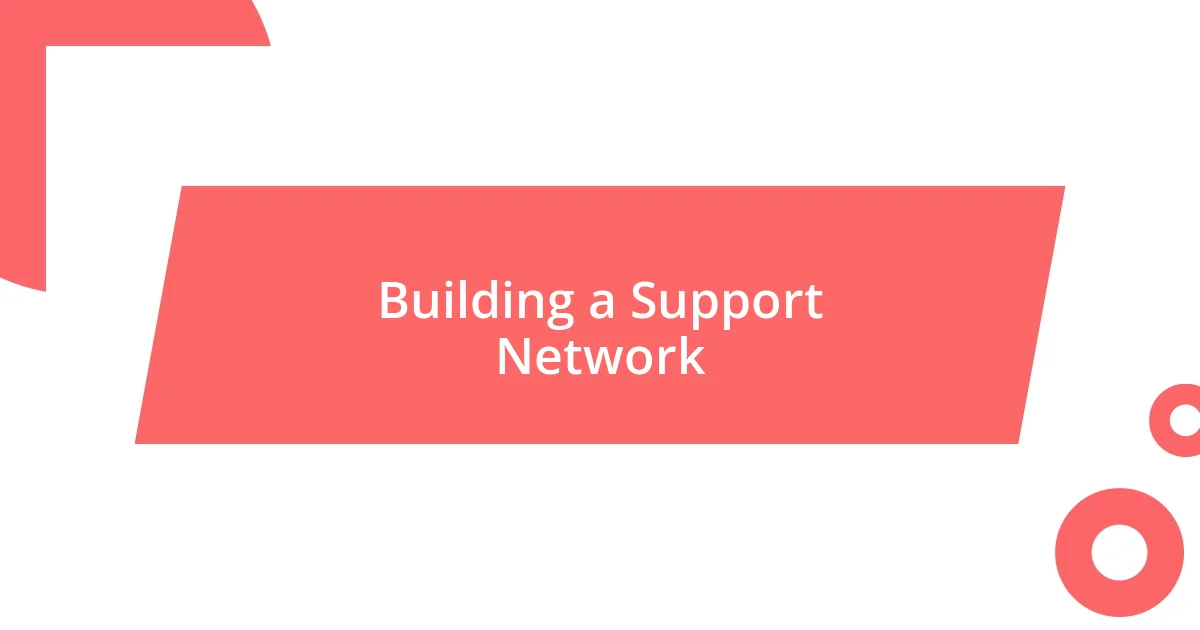
Building a Support Network
Building a support network is crucial during times of crisis, and I’ve learned this firsthand. When I was managing a significant project that suddenly faced a huge setback, I realized how much I relied on a mix of coworkers for emotional and practical support. Just knowing I had trusted people to turn to not only lifted my spirits but also sparked innovative solutions we might not have discovered independently.
I recall a time in my life when a personal crisis hit, and I reached out to a few close friends who had gone through similar experiences. Their understanding and shared camaraderie allowed me to navigate my feelings more openly, and it strengthened our bond. Have you ever shared a struggle with someone only to find that it creates an unexpected connection? That shared experience can be so powerful; it deepens not just your understanding of one another, but also reinforces the importance of having people who genuinely care.
What’s fascinating about building a support network is how diverse it can be. I once organized a small group of acquaintances with different backgrounds—each bringing unique strengths to the table. When we encountered a challenging situation, we pooled our skills and insights, which led to creative solutions that none of us could have conceived alone. It was a vivid reminder that drawing from a variety of perspectives often enriches the problem-solving process. Isn’t it interesting how our differences can become our greatest assets during tough times?
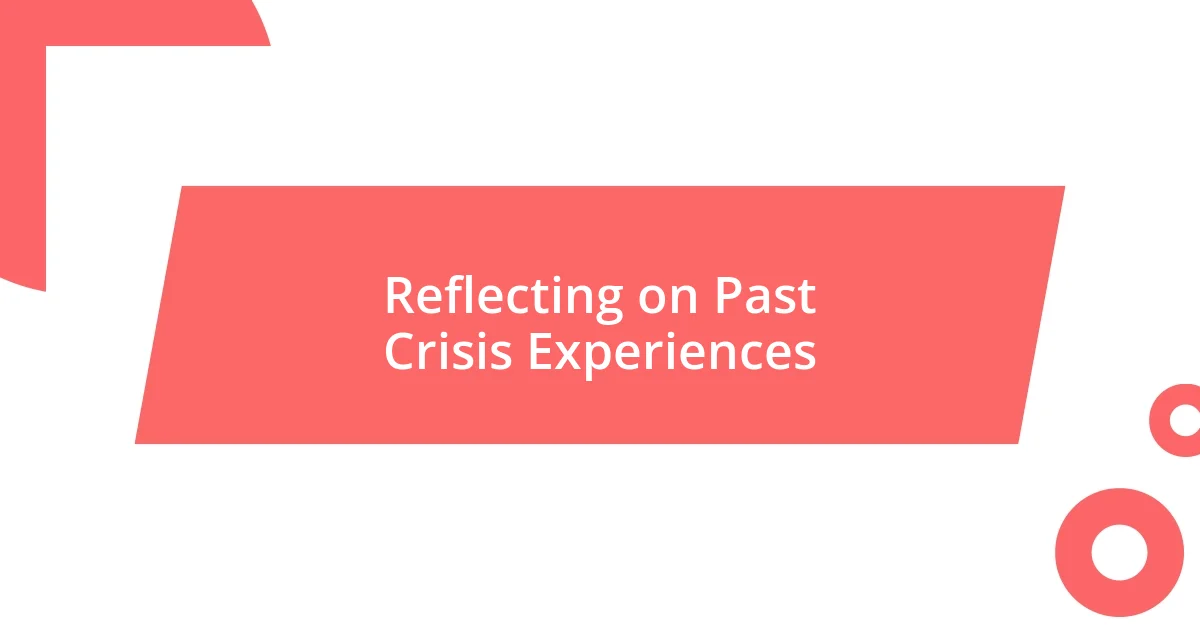
Reflecting on Past Crisis Experiences
Reflecting on past crisis experiences is a powerful way to gain perspective and inform future actions. I remember a particularly challenging moment during a natural disaster when I had to make rapid decisions on the ground. Looking back, I realize that the overwhelming feelings of anxiety were countered by a deep sense of purpose. It was as if reflecting on that moment helped me recognize how resilience can emerge from chaos, making me appreciate the strength we often don’t realize we possess.
In another instance, I navigated a workplace crisis that involved a sudden loss of a key team member. I often reflect on how empathy played a crucial role in that situation. Gathering the team to share our feelings and fears transformed our grief into a collective strength. Do you recall a time when openly discussing emotions helped your group bond in unexpected ways? For me, that experience highlighted how vulnerability can lead to deeper connections, emphasizing the importance of creating safe spaces for dialogue.
On a personal level, I’ve often found that reflecting on my responses to crises allows me to identify growth areas. After experiencing burnout during a particularly stressful project, I took the time to analyze what went wrong. Recognizing my limits prompted me to prioritize self-care and set clearer boundaries moving forward. Isn’t it enlightening how reflection not only helps us learn but also empowers us to take proactive steps in managing future crises? Each experience has gifted me with insights that continuously shape my approach to handling adversity.
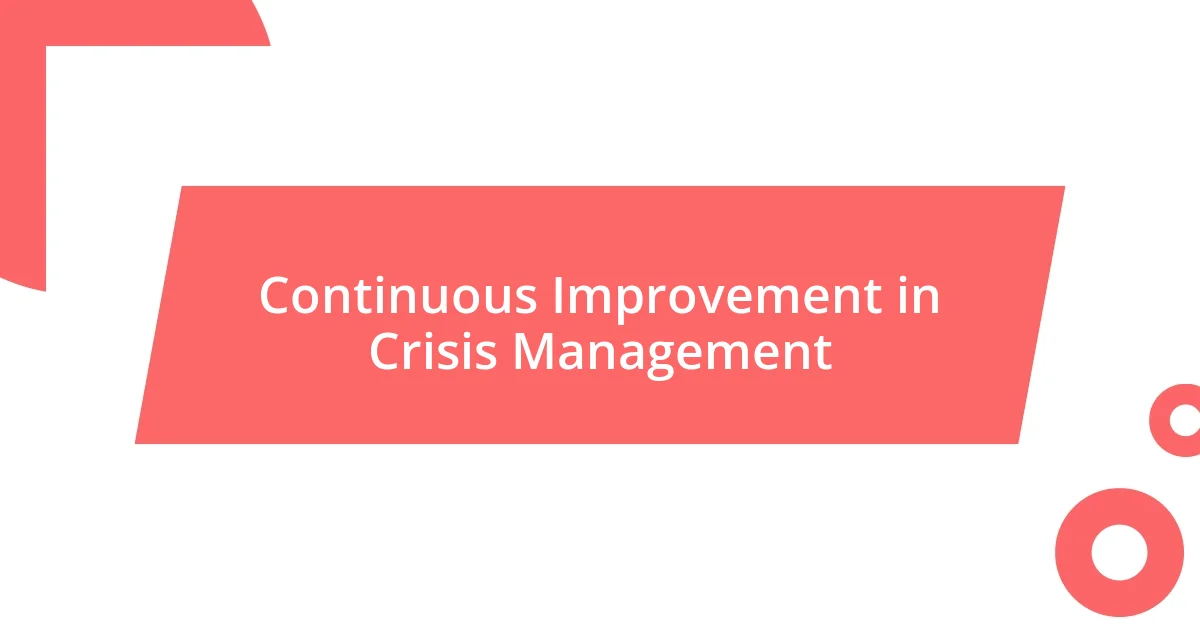
Continuous Improvement in Crisis Management
Continuous improvement in crisis management is an ongoing journey that requires introspection and adaptation. I remember a pivotal moment during an unexpected crisis when my initial response fell short. Afterward, I gathered feedback from my team and realized we had overlooked key communication steps. Listening to their perspectives opened my eyes to how essential it is to foster an environment where everyone feels comfortable sharing their thoughts. Have you ever felt your response could have been stronger if only you’d sought input from others?
I find that regularly revisiting and refining our crisis management strategies is crucial for growth. One experience I had involved revising our emergency protocols after a close call with a critical deadline. During our review, I saw that some team members had ideas that could streamline our processes. Implementing these improvements not only enhanced our readiness but also made everyone feel more invested in our collective success. It’s fascinating how simple tweaks can lead to significant improvements, isn’t it?
Moreover, I’ve discovered that sharing lessons learned with others can amplify our collective knowledge. Following a particularly intense crisis, I led a workshop where I shared my experiences and invited participants to discuss their own challenges. The collaborative nature of these discussions unearthed innovative strategies that had never crossed my mind. The emotional connections and insights exchanged during that session were invaluable, highlighting how shared learning can transform our crisis management approach. Have you ever participated in a debriefing that changed your perspective entirely? I cherish those moments, as they’re where growth truly happens.

